As kids coding experts, parents always ask us if their child is ready for kids programming classes. This always leads to a discussion about the specific student, including their background and interests. From there, it doesn’t boil down to a simple yes or no, it is essential to consider if the particular coding class is a good match for their age and experience.
There is a huge advantage to starting early. However, if your elementary school child is not ready to learn how to code or you put them into a coding course that isn’t a good fit, it could backfire. So, let’s cover everything you need to know!
Benefits of Introducing Programming at a Young Age
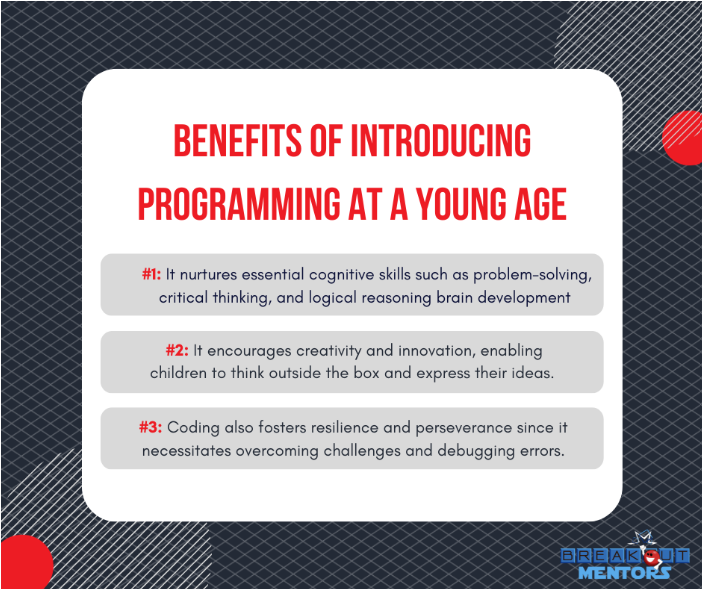
Introducing programming at a young age offers many benefits to children. It nurtures essential cognitive skills such as problem-solving, critical thinking, and logical reasoning brain development, all of which are crucial in coding and various aspects of life.
It encourages creativity and innovation, enabling children to think outside the box and express their ideas. Programming classes can instill a sense of empowerment by allowing kids to create and control technology, transforming them from passive consumers into active, informed users of the digital world.
Coding also fosters resilience and perseverance since it necessitates overcoming challenges and debugging errors. Overall, introducing programming at a young age equips children with the tools to navigate an increasingly digital world, fostering both personal and professional growth.
3 Signs Someone is Ready for Programming Classes
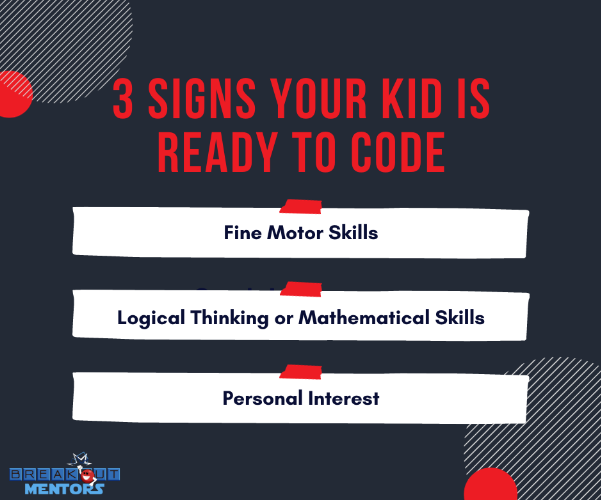
Unfortunately, there is not a specific age that everyone is ready to start learning advanced programming concepts. Otherwise this would be a short article! Childhood development is a fascinating field. There is a wide range: some young kids are blessed with advanced logical reasoning skills, and others develop them at different times.
Fine Motor Skills
Traditionally, many people have believed that kids need to be 9-11 years old to be ready to code. This is a reasonable estimate for preparedness to type code in text-based languages like Java or Python. These require fine motor skills and mouse and keyboard proficiency. Some block-based languages don’t require those skills, so they could potentially be used with even younger children.
Logical Thinking or Mathematical Skills
Coding requires several cognitive skills, including problem-solving abilities and logical thinking. These skills can be built upon as young as 6 or 7 years old. Kids who really thrive in coding at this age are few and far between but they do exist.
The closest school subject is math, so people often use math proficiency to judge coding readiness. Math involves logic like subtracting two numbers while carrying the tens digit. It frequently includes reasoning skills like applying math to a word problem. While these skills are similar to what is needed for coding, math proficiency should not be used to gatekeep coding.
Personal Interest
Plenty of kids engage more with coding video games or projects with real-world applications than math problems. “Bobby had 2 quarters, 2 dimes, and 2 pennies. He spent 37 cents. How much money does he have left?” However, if your kid loves a challenging math problem, there’s a good chance they will also love an interesting computer science problem.
Potentially more important than any of those skills is your child’s interest. Most of our mentors would agree that the best kids they get to work with are the ones who asked their parents to sign them up for coding classes. Kids who like to tinker and are curious about technology are motivated to learn. That motivation will help them more than innate reasoning skills.
Tools and Resources for Kids
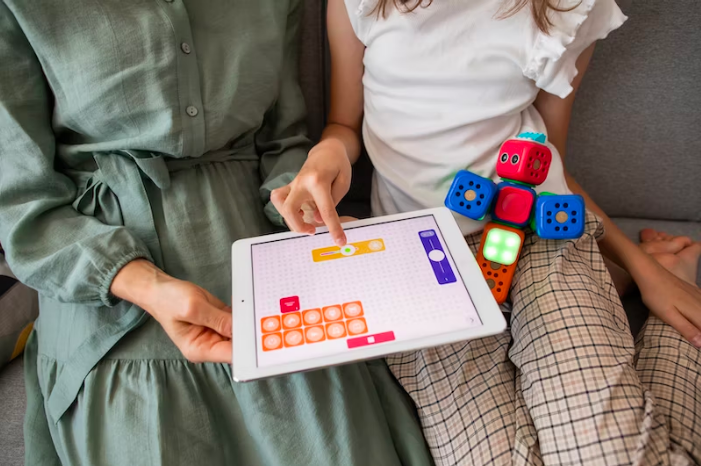
What can you do if your student is not ready to learn programming concepts through structured courses? Should you just wait?
Even though your child might not be ready for a mentor to introduce concepts, you can encourage the logical thinking skills necessary. Let your student explore and tinker on their own with games like Light-bot. You can even set them up on Scratch and let them discover things on their own. There are even some great board games that you could play with your child.
But have no expectations or try to encourage them to do things a certain way. When the time is right, you can introduce new concepts and better ways of doing things. And when this time comes, you should seek out a programming mentor to direct their learning, provide appropriate challenges, and keep it fun!
Breakout Mentors Student Examples
Working closely with a talented 9-year-old in one of our programming classes, I had the privilege of witnessing a remarkable journey of creativity and technical growth. This young web developer displayed an uncanny ability to build complete websites using HTML, CSS, and JavaScript, defying conventional age-related expectations.
While we encountered certain limits in terms of complexity and abstraction due to her age, the quality of work was astounding. Her web creations radiated with her vibrant personality, exuberant love for cats and dogs, and her fascination with stuffed animals. We guided her through the basics, focusing on foundational concepts, and she used these building blocks to craft captivating and whimsical web applications.
Her projects showcased her technical prowess and encapsulated her unique passions and flair, reminding us of the extraordinary capabilities that young minds can unleash with the right guidance and encouragement.
Providing a Fun Way for Kids to Learn Programming
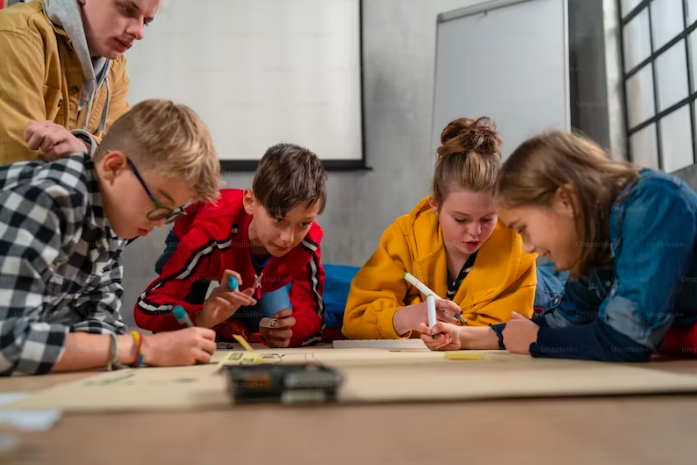
Ensuring each lesson is fun in our programming classes isn’t an afterthought or a nice bonus – it is a vital component for success. If a student isn’t having fun, they will not be motivated to learn. For a short period of time they may be able to stick it out (especially if their parents make them), but in the long run they will drop out before reaching their full potential.
Breakout Mentors aims to generate a sustained interest in computer science by making it enjoyable for our students. Learning to code well isn’t something that anyone can hope to achieve in a single year. It takes incremental progress over the course of many years. Even then there is always something else that can be learned. If you are hoping for this kind of personal development you better find a way to make it enjoyable.
The good news? Coding as one of the daily activities should be way more fun than violin lessons, unless you are doing something horribly wrong!
What is the Breakout Mentors Strategy for Fun?
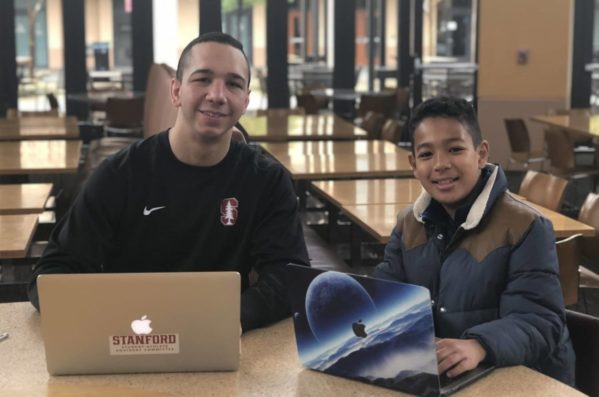
While we would love to have your kids come learn with our mentors, we are also willing to share our secrets so you can start some of this at home. It starts with smiling a lot. Seriously, it is contagious and if you are smiling you are having fun! But we stop short of forcing our students to bite down on a pencil during our sessions.
Placing the psychology of happiness and all joking aside, we have some specific strategies for making each individual lesson fun. First, we take into account each student’s interests. Do they like playing video games or would they rather watch a movie? If the answer is video games, start with Scratch. If movies, start with Alice. Even if the student is only mildly interested in video games, I would suggest starting with Scratch – games are more fun when you are the inventor!
We have several games and projects typically used early in our programming classes curriculum. I won’t go into specific examples here, but want to point out that they can all be tweaked to appeal more to the particular student. For example, if you are building a game to move a character around a puzzle, should the character be a cute elephant or a football player? Each room could be a section of the zoo or a different sports challenge. Get creative and the student’s ideas will fill in the rest!
Challenging Yet Attainable
Is there anything worse than struggling on a problem and never quite solving it? With beginner coders, this is a definite possibility. The tendency of teachers is to provide the answer and hope that they remember it next time. I’m not suggesting this is wrong, just that you aren’t providing the optimal learning environment.
In fact, there just may be something worse than this – indefinitely toiling on unchallenging tasks. This leads to boredom and learning very little. There is a perfect balance – I call it challenging, yet attainable. You know when you have achieved this goal when you let the student search for an answer on their own and it takes a finite amount of time to solve (anywhere from 5 to 30 seconds). From there keep increasing the difficulty. This brings us to the final step.
Focus on Output
You can absolutely nail the previous points in this article, but if you forget about this one, you will fail as a teacher. Provide projects with an output that the student can be proud of at the end of the session. You don’t want the student to wonder what they accomplished in the last hour – you want a working piece of software he can show off to his parents, siblings, and friends.
How do you accomplish this? Start with very short projects that have an infinite number of potential additional features, halfway through the lesson, try to have a working program. From there, you can perfect things. Add a score or timer. Add sounds and general polish. Some color and animations will spruce things up. These little features are fun and make the whole project feel like an even bigger accomplishment.
You Can Do It!
Teaching a kid to program is a worthwhile goal, and with these guidelines, hopefully, it is an attainable extracurricular activity. Of course there is a certain amount of expertise and communication skills gained with experience. It used to be that you had to live in the Bay Area to work with Breakout Mentors, but now we can provide high-quality programming classes for your kids anywhere in the world through video conference. Contact us to learn more.
